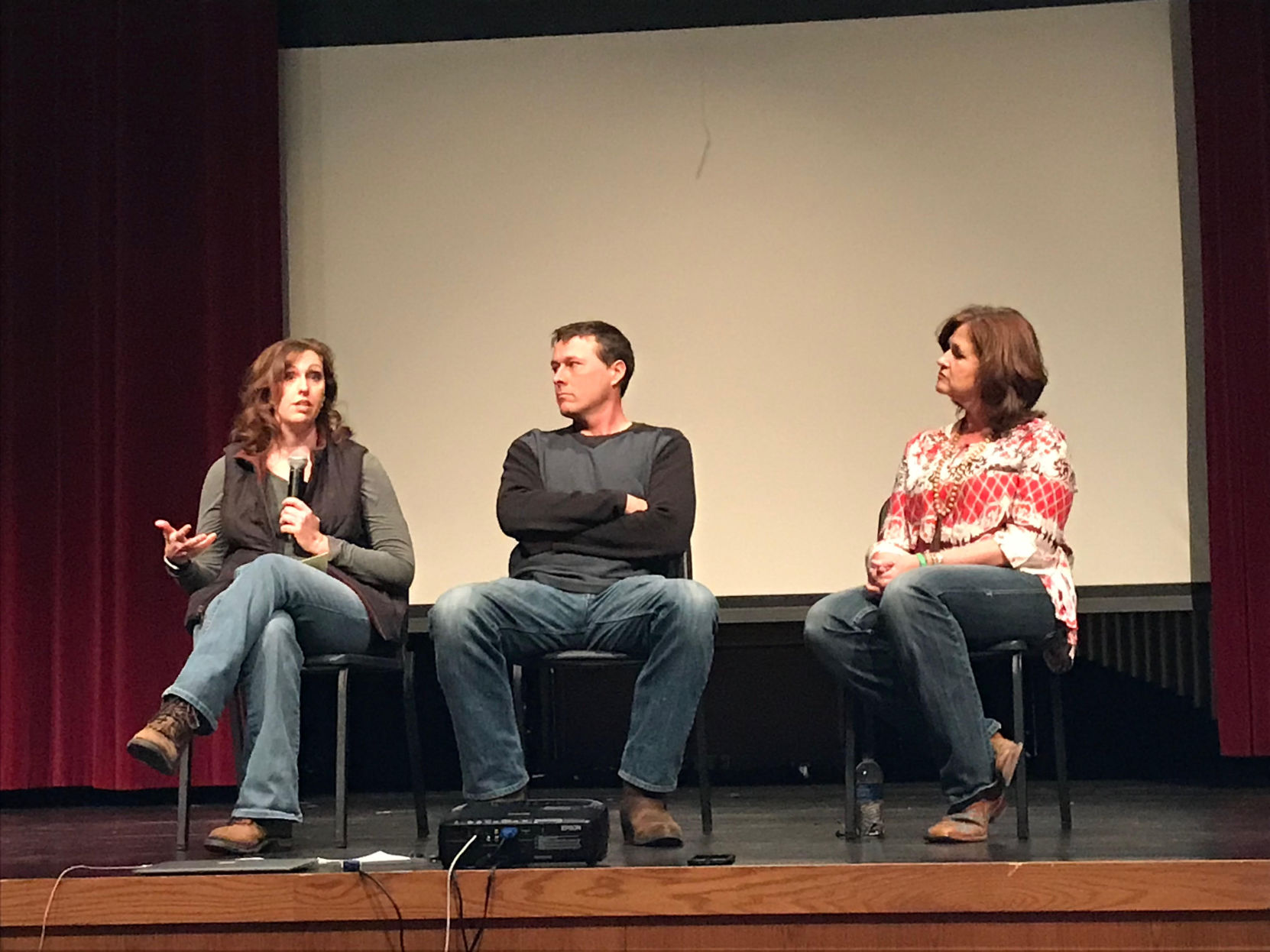Lyons-Blythe, Burgess and Klingenberg share how they are ‘branding’ their ranch through social media
Debbie Lyons-Blythe talks passionately about her family’s ranching roots amid the tallgrass prairie near White City, Kansas, where cattle have grazed since the Blythe family first homesteaded here in 1890.
Generations of Blythes have worked to make the operation what it is today.
A realization hit Lyons-Blythe as she spoke to an out-of-state cousin in her kitchen a decade ago while she was fixing dinner. It doesn’t take long for even deep-rooted agriculture families to become disconnected, said Lyons-Blythe, who shared why she became an agricultural advocate during a session at the Kansas Cattle Drive last month.
It was 2009. Shannon and her family were visiting the farm from Denver.
“One day I was cooking dinner for our kids…we had at the time a whole grill filled with hamburgers for everybody. And Shannon sneaks up beside me and says, ‘Debbie, we can’t eat that much beef.’ And I said, ‘what, why?’ And she said because of the antibiotics in beef.”
It was that experience that led Lyons-Blythe to begin telling her daily ranch story through blogs, Facebook, Twitter and other social media platforms.
Lyons-Blythe, along with Rice County farmer Jenny Burgess and Marion County farmer Derek Klingenberg spoke about “Branding Your Ranch” at the third annual event in downtown Buhler, Kansas.
Outreach is more important than ever because the average American is now at least three generations removed from the family farm. But the growing disconnect by even close relatives is alarming, said Lyons-Blythe. Shannon, who had a parent grow up on the same operation as Lyons-Blythe’s husband, is just one generation removed.
“And she spends time on the farm and she is going to be a part owner in our farm—and she doesn’t know the answers to the concerns about hormones, antibiotics and animal welfare and those questions that constantly pop up on social media,” Lyons-Blythe said.
As Shannon and her family drove back to Denver, Lyons-Blythe decided to be an advocate.
Consumers, she said “want to know what is going on the farm and we have to take the time to tell them.”
Telling the story
Burgess and her husband, Geoff, are first-generation farmers in Rice County. But even in a rural Kansas county, Burgess said she realized quickly that residents wanted to know where their food was coming from.
When her children started attending school, “I was absolutely flabbergasted with the amount of mothers, sitting in a corner, discussing ‘what am I going to feed my kids?’” said Burgess, adding the conversation included GMOs, antibiotics and chemical applications on crops.
There are many ways to tell the story, said Klingenberg, who is known as “Farmer Derek” on YouTube. His pop-music video parodies with a farm focus generates millions of views. He said he puts a green screen in his shop, going in at night and filming scenes after a day working on the farm.
Lyons-Blythe said she might have a conversation on Twitter while baling hay or taking care of cattle.
Burgess said she writes a blog, but also notices the young generation wants instant gratification. She tries to connect with them through Snapchat and Instagram.
“They don’t want a long story,” she said. “They want to thumb through their news feed.”
She also makes herself accessible to the media, she said, adding an interview with the local television station recently took just five minutes.
“What can I do for them to help them understand agriculture and what we are doing?” she said.
Klinkenberg said he gets some money from YouTube advertising.
However, he said, “I always remind myself, I wasn’t doing it for the money and I still don’t.”
He added with a smile, “It’s just an excuse for me to do weird stuff and I love it.”
Burgess said social media isn’t for everyone. Face to face is good, too, whether it is at a school or grocery store. Sometimes, she said, much to her children’s dismay, she stops customers to see what meat they have in their cart and asks what they are having for dinner.
Everyone is an influencer
Lyons-Blythe admitted the answer she gave her relative a decade ago, wasn’t the best one. She told her that the family’s beef was “home raised” and threw every other rancher “under the bus.”
Now, over the past decade, she has been telling agriculture’s story on her blog at www.kidscowsandgrass.com.
Quoting Temple Grandin, a renowned Colorado State University animal science professor who spoke at the event, Lyons-Blythe said, “If you are doing it on your farm and ranch and you can’t show your out-of-town wedding guests, then why are you doing it?”
About five years ago, Lyons-Blythe hosted a woman from New York City who had asked a question on Anderson Cooper’s show, “Anderson Live,” about antibiotics and hormones in beef.
The woman visited the ranch.
Lyons-Blythe fielded questions about how she raises beef. She told her everything that grows has hormones and put a small hormone implant in her hand.
“I said ‘this a hormone implant, and we put it under the skin in their ear, and it boosts the animal’s natural hormones so we can create more lean beef.’ I saw the light bulb go on.”
The woman went back on “Anderson Live” the next week and told him she felt confident buying whatever beef was in the grocery store because it was people like Lyons-Blythe who are making those decisions and raising that beef.
Lyons-Blythe said everyone has his or her own audience he or she can influence.
“We are too many times giving the consumer a novel and all they want is a 140-character tweet,” she said.
“I try to remember consumers—all they really want is to feel good about what they are feeding their family.…I think they just want to know their food is safe and nutritious.”
Amy Bickel can be reached at 620-860-9433 or [email protected].




